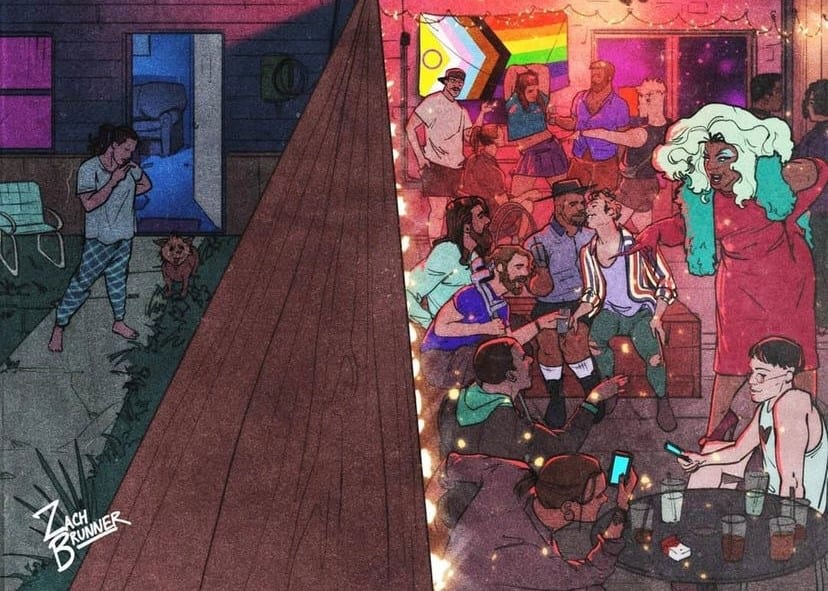Generation Hispanic TV - Live
‘In-person interactions are best for people to navigate their trauma’: LGBTQ+ people and COVID-19
[vc_row type=”in_container” full_screen_row_position=”middle” column_margin=”default” column_direction=”default” column_direction_tablet=”default” column_direction_phone=”default” scene_position=”center” top_padding=”5%” text_color=”dark” text_align=”left” row_border_radius=”none” row_border_radius_applies=”bg” overlay_strength=”0.3″ gradient_direction=”left_to_right” shape_divider_position=”bottom” bg_image_animation=”none” shape_type=””][vc_column column_padding=”no-extra-padding” column_padding_tablet=”inherit” column_padding_phone=”inherit” column_padding_position=”all” background_color_opacity=”1″ background_hover_color_opacity=”1″ column_shadow=”none” column_border_radius=”none” column_link_target=”_self” gradient_direction=”left_to_right” overlay_strength=”0.3″ width=”1/1″ tablet_width_inherit=”default” tablet_text_alignment=”default” phone_text_alignment=”default” column_border_width=”none” column_border_style=”solid” bg_image_animation=”none”][vc_raw_js]JTNDc2NyaXB0JTIwdHlwZSUzRCUyMnRleHQlMkZqYXZhc2NyaXB0JTIyJTIwY2xhc3MlM0QlMjJ0ZWFkcyUyMiUyMHNyYyUzRCUyMiUyRiUyRmEudGVhZHMudHYlMkZwYWdlJTJGMTMyMDI2JTJGdGFnJTIyJTIwYXN5bmMlM0QlMjJ0cnVlJTIyJTNFJTNDJTJGc2NyaXB0JTNF[/vc_raw_js][vc_raw_html]JTNDc2NyaXB0JTIwdHlwZSUzRCUyMnRleHQlMkZqYXZhc2NyaXB0JTIyJTNFZG9jdW1lbnQuQnJpZElmcmFtZUJ1cnN0JTNEdHJ1ZSUzQiUzQyUyRnNjcmlwdCUzRSUyMCUzQ3NjcmlwdCUyMHR5cGUlM0QlMjJ0ZXh0JTJGamF2YXNjcmlwdCUyMiUzRSUyMHZhciUyMF9ib3MlMjAlM0QlMjBfYm9zJTdDJTdDJTVCJTVEJTNCJTIwX2Jvcy5wdXNoJTI4JTdCJTIwJTIyZGl2JTIyJTNBJTIwJTIyQnJpZF8xMDczMjM4MiUyMiUyQyUyMCUyMm9iaiUyMiUzQSUyMCU3QiUyMmlkJTIyJTNBJTIyMTU2OTIlMjIlMkMlMjJ3aWR0aCUyMiUzQSUyMjMwMCUyMiUyQyUyMmhlaWdodCUyMiUzQSUyMjI1MCUyMiU3RCUyMCU3RCUyOSUzQiUyMCUzQyUyRnNjcmlwdCUzRSUyMCUzQ3NjcmlwdCUyMHR5cGUlM0QlMjJ0ZXh0JTJGamF2YXNjcmlwdCUyMiUyMGFzeW5jJTIwc3JjJTNEJTIyJTJGJTJGc2VydmljZXMuYnJpZC50diUyRnBsYXllciUyRmJ1aWxkJTJGYnJpZC5vdXRzdHJlYW0ubWluLmpzJTIyJTNFJTNDJTJGc2NyaXB0JTNF[/vc_raw_html][vc_raw_js]JTNDJTIxLS0lMjBDaGFwdGVyJTIwWl8zMDB4MjUwX01CJTIwJTVCamF2YXNjcmlwdCU1RCUyMC0tJTNFJTBBJTNDc2NyaXB0JTIwdHlwZSUzRCUyMnRleHQlMkZqYXZhc2NyaXB0JTIyJTNFJTBBdmFyJTIwcm5kJTIwJTNEJTIwd2luZG93LnJuZCUyMCU3QyU3QyUyME1hdGguZmxvb3IlMjhNYXRoLnJhbmRvbSUyOCUyOSUyQTEwZTYlMjklM0IlMEF2YXIlMjBwaWQ0NTMxMTglMjAlM0QlMjB3aW5kb3cucGlkNDUzMTE4JTIwJTdDJTdDJTIwcm5kJTNCJTBBdmFyJTIwcGxjNDUzMTE4JTIwJTNEJTIwd2luZG93LnBsYzQ1MzExOCUyMCU3QyU3QyUyMDAlM0IlMEF2YXIlMjBhYmt3JTIwJTNEJTIwd2luZG93LmFia3clMjAlN0MlN0MlMjAlMjclMjclM0IlMEF2YXIlMjBhYnNyYyUyMCUzRCUyMCUyN2h0dHBzJTNBJTJGJTJGYWRzLmJyYW5kYWR2YW5jZS5jby51ayUyRmFkc2VydmUlMkYlM0JJRCUzRDE3NTA5MiUzQnNpemUlM0QzMDB4MjUwJTNCc2V0SUQlM0Q0NTMxMTglM0J0eXBlJTNEanMlM0JzdyUzRCUyNyUyQnNjcmVlbi53aWR0aCUyQiUyNyUzQnNoJTNEJTI3JTJCc2NyZWVuLmhlaWdodCUyQiUyNyUzQnNwciUzRCUyNyUyQndpbmRvdy5kZXZpY2VQaXhlbFJhdGlvJTJCJTI3JTNCa3clM0QlMjclMkJhYmt3JTJCJTI3JTNCcGlkJTNEJTI3JTJCcGlkNDUzMTE4JTJCJTI3JTNCcGxhY2UlM0QlMjclMkIlMjhwbGM0NTMxMTglMkIlMkIlMjklMkIlMjclM0JybmQlM0QlMjclMkJybmQlMkIlMjclM0JjbGljayUzRENMSUNLX01BQ1JPX1BMQUNFSE9MREVSJTI3JTNCJTBBZG9jdW1lbnQud3JpdGUlMjglMjclM0NzY3IlMjclMkIlMjdpcHQlMjBzcmMlM0QlMjIlMjclMkJhYnNyYyUyQiUyNyUyMiUyMHR5cGUlM0QlMjJ0ZXh0JTJGamF2YXNjcmlwdCUyMiUzRSUzQyUyRnNjciUyNyUyQiUyN2lwdCUzRSUyNyUyOSUzQiUwQSUzQyUyRnNjcmlwdCUzRQ==[/vc_raw_js][vc_row_inner column_margin=”default” column_direction=”default” column_direction_tablet=”default” column_direction_phone=”default” text_align=”left”][vc_column_inner column_padding=”no-extra-padding” column_padding_tablet=”inherit” column_padding_phone=”inherit” column_padding_position=”all” background_color_opacity=”1″ background_hover_color_opacity=”1″ column_shadow=”none” column_border_radius=”none” column_link_target=”_self” gradient_direction=”left_to_right” overlay_strength=”0.3″ width=”1/1″ tablet_width_inherit=”default” column_border_width=”none” column_border_style=”solid” bg_image_animation=”none”][vc_column_text el_class=”article-title”]
‘In-person interactions are best for people to navigate their trauma’: LGBTQ+ people and COVID-19
[/vc_column_text][vc_column_text el_class=”article-byline, popmake-teddy-profile”]
by Alex Bright
[/vc_column_text][divider line_type=”No Line” custom_height=”20″][vc_column_text]
It may be hard to believe, but Covid-19 has been with us for nearly two years now, and has forced many countries worldwide into national lockdowns over the last 730 days.
Whilst many have (understandably) suffered both mentally and physically with social distancing measures, making it harder to socialize and exercise for example, some of us have been able to remain more positive, and have taken it in our stride. In this article I am especially looking at how it may have affected young queer people – specifically, members of generation Z, how it may have affected their sense of identity, and what they think the future of pride and the LGBTQ+ community will look like as a whole because of the pandemic.
[/vc_column_text][/vc_column_inner][/vc_row_inner][vc_row_inner column_margin=”default” column_direction=”default” column_direction_tablet=”default” column_direction_phone=”default” text_align=”left”][vc_column_inner column_padding=”no-extra-padding” column_padding_tablet=”inherit” column_padding_phone=”inherit” column_padding_position=”all” background_color_opacity=”1″ background_hover_color_opacity=”1″ column_shadow=”none” column_border_radius=”none” column_link_target=”_self” gradient_direction=”left_to_right” overlay_strength=”0.3″ width=”1/1″ tablet_width_inherit=”default” column_border_width=”none” column_border_style=”solid” bg_image_animation=”none”][vc_raw_js]JTNDJTIxLS0lMjBDaGFwdGVyJTIwWl8zMDB4MjUwX01CJTIwJTVCamF2YXNjcmlwdCU1RCUyMC0tJTNFJTBBJTNDc2NyaXB0JTIwdHlwZSUzRCUyMnRleHQlMkZqYXZhc2NyaXB0JTIyJTNFJTBBdmFyJTIwcm5kJTIwJTNEJTIwd2luZG93LnJuZCUyMCU3QyU3QyUyME1hdGguZmxvb3IlMjhNYXRoLnJhbmRvbSUyOCUyOSUyQTEwZTYlMjklM0IlMEF2YXIlMjBwaWQ0NTMxMTglMjAlM0QlMjB3aW5kb3cucGlkNDUzMTE4JTIwJTdDJTdDJTIwcm5kJTNCJTBBdmFyJTIwcGxjNDUzMTE4JTIwJTNEJTIwd2luZG93LnBsYzQ1MzExOCUyMCU3QyU3QyUyMDAlM0IlMEF2YXIlMjBhYmt3JTIwJTNEJTIwd2luZG93LmFia3clMjAlN0MlN0MlMjAlMjclMjclM0IlMEF2YXIlMjBhYnNyYyUyMCUzRCUyMCUyN2h0dHBzJTNBJTJGJTJGYWRzLmJyYW5kYWR2YW5jZS5jby51ayUyRmFkc2VydmUlMkYlM0JJRCUzRDE3NTA5MiUzQnNpemUlM0QzMDB4MjUwJTNCc2V0SUQlM0Q0NTMxMTglM0J0eXBlJTNEanMlM0JzdyUzRCUyNyUyQnNjcmVlbi53aWR0aCUyQiUyNyUzQnNoJTNEJTI3JTJCc2NyZWVuLmhlaWdodCUyQiUyNyUzQnNwciUzRCUyNyUyQndpbmRvdy5kZXZpY2VQaXhlbFJhdGlvJTJCJTI3JTNCa3clM0QlMjclMkJhYmt3JTJCJTI3JTNCcGlkJTNEJTI3JTJCcGlkNDUzMTE4JTJCJTI3JTNCcGxhY2UlM0QlMjclMkIlMjhwbGM0NTMxMTglMkIlMkIlMjklMkIlMjclM0JybmQlM0QlMjclMkJybmQlMkIlMjclM0JjbGljayUzRENMSUNLX01BQ1JPX1BMQUNFSE9MREVSJTI3JTNCJTBBZG9jdW1lbnQud3JpdGUlMjglMjclM0NzY3IlMjclMkIlMjdpcHQlMjBzcmMlM0QlMjIlMjclMkJhYnNyYyUyQiUyNyUyMiUyMHR5cGUlM0QlMjJ0ZXh0JTJGamF2YXNjcmlwdCUyMiUzRSUzQyUyRnNjciUyNyUyQiUyN2lwdCUzRSUyNyUyOSUzQiUwQSUzQyUyRnNjcmlwdCUzRQ==[/vc_raw_js][divider line_type=”No Line” custom_height=”30″][/vc_column_inner][/vc_row_inner][vc_row_inner column_margin=”default” column_direction=”default” column_direction_tablet=”default” column_direction_phone=”default” text_align=”left”][vc_column_inner column_padding=”no-extra-padding” column_padding_tablet=”inherit” column_padding_phone=”inherit” column_padding_position=”all” background_color_opacity=”1″ background_hover_color_opacity=”1″ column_shadow=”none” column_border_radius=”none” column_link_target=”_self” gradient_direction=”left_to_right” overlay_strength=”0.3″ width=”1/2″ tablet_width_inherit=”default” column_border_width=”none” column_border_style=”solid” bg_image_animation=”none”][vc_column_text]For this piece, I asked a total of five respondents to give me their views on lockdown and queer identity, and got a number of interesting but differing responses from each. The first person I interviewed was Jade, a 22-year-old from Brisbane, Australia about her experiences with the restrictions that the coronavirus pandemic has forced upon us and how she has managed to keep in touch with fellow queer people during this particularly difficult time. Jade uses she/her pronouns.
Q: “How do you personally identify?”
A: “I personally identify as a queer trans woman.”
Q: “Do you think that lockdown and covid-19 has affected your queer/gender identity?
A: “I don’t think so. I’ve always been a bit non specific about my romantic/sexual identity; not so much gender. Maybe expression a bit.”
Q: “Do you feel isolated from other queer people because of lockdown? If so, how have you remedied this? Do you use online groups to connect with others?
A: “Somewhat. I haven’t been to a local group in over a year that I used to attend quite regularly. I am quite active in a different group of friends now. I am in a few local groups but I prefer smaller groups of friends I’m comfortable with than strangers.”[/vc_column_text][/vc_column_inner][vc_column_inner column_padding=”no-extra-padding” column_padding_tablet=”inherit” column_padding_phone=”inherit” column_padding_position=”all” background_color_opacity=”1″ background_hover_color_opacity=”1″ column_shadow=”none” column_border_radius=”none” column_link_target=”_self” gradient_direction=”left_to_right” overlay_strength=”0.3″ width=”1/2″ tablet_width_inherit=”default” column_border_width=”none” column_border_style=”solid” bg_image_animation=”none”][image_with_animation image_url=”7422″ animation=”Fade In” hover_animation=”none” alignment=”” border_radius=”none” box_shadow=”none” image_loading=”default” max_width=”100%” max_width_mobile=”default”][divider line_type=”No Line” custom_height=”30″][vc_raw_js]JTNDJTIxLS0lMjBDaGFwdGVyJTIwWl8zMDB4MjUwX01CJTIwJTVCamF2YXNjcmlwdCU1RCUyMC0tJTNFJTBBJTNDc2NyaXB0JTIwdHlwZSUzRCUyMnRleHQlMkZqYXZhc2NyaXB0JTIyJTNFJTBBdmFyJTIwcm5kJTIwJTNEJTIwd2luZG93LnJuZCUyMCU3QyU3QyUyME1hdGguZmxvb3IlMjhNYXRoLnJhbmRvbSUyOCUyOSUyQTEwZTYlMjklM0IlMEF2YXIlMjBwaWQ0NTMxMTglMjAlM0QlMjB3aW5kb3cucGlkNDUzMTE4JTIwJTdDJTdDJTIwcm5kJTNCJTBBdmFyJTIwcGxjNDUzMTE4JTIwJTNEJTIwd2luZG93LnBsYzQ1MzExOCUyMCU3QyU3QyUyMDAlM0IlMEF2YXIlMjBhYmt3JTIwJTNEJTIwd2luZG93LmFia3clMjAlN0MlN0MlMjAlMjclMjclM0IlMEF2YXIlMjBhYnNyYyUyMCUzRCUyMCUyN2h0dHBzJTNBJTJGJTJGYWRzLmJyYW5kYWR2YW5jZS5jby51ayUyRmFkc2VydmUlMkYlM0JJRCUzRDE3NTA5MiUzQnNpemUlM0QzMDB4MjUwJTNCc2V0SUQlM0Q0NTMxMTglM0J0eXBlJTNEanMlM0JzdyUzRCUyNyUyQnNjcmVlbi53aWR0aCUyQiUyNyUzQnNoJTNEJTI3JTJCc2NyZWVuLmhlaWdodCUyQiUyNyUzQnNwciUzRCUyNyUyQndpbmRvdy5kZXZpY2VQaXhlbFJhdGlvJTJCJTI3JTNCa3clM0QlMjclMkJhYmt3JTJCJTI3JTNCcGlkJTNEJTI3JTJCcGlkNDUzMTE4JTJCJTI3JTNCcGxhY2UlM0QlMjclMkIlMjhwbGM0NTMxMTglMkIlMkIlMjklMkIlMjclM0JybmQlM0QlMjclMkJybmQlMkIlMjclM0JjbGljayUzRENMSUNLX01BQ1JPX1BMQUNFSE9MREVSJTI3JTNCJTBBZG9jdW1lbnQud3JpdGUlMjglMjclM0NzY3IlMjclMkIlMjdpcHQlMjBzcmMlM0QlMjIlMjclMkJhYnNyYyUyQiUyNyUyMiUyMHR5cGUlM0QlMjJ0ZXh0JTJGamF2YXNjcmlwdCUyMiUzRSUzQyUyRnNjciUyNyUyQiUyN2lwdCUzRSUyNyUyOSUzQiUwQSUzQyUyRnNjcmlwdCUzRQ==[/vc_raw_js][/vc_column_inner][/vc_row_inner][vc_row_inner column_margin=”default” column_direction=”default” column_direction_tablet=”default” column_direction_phone=”default” text_align=”left”][vc_column_inner column_padding=”no-extra-padding” column_padding_tablet=”inherit” column_padding_phone=”inherit” column_padding_position=”all” background_color_opacity=”1″ background_hover_color_opacity=”1″ column_shadow=”none” column_border_radius=”none” column_link_target=”_self” gradient_direction=”left_to_right” overlay_strength=”0.3″ width=”1/2″ tablet_width_inherit=”default” column_border_width=”none” column_border_style=”solid” bg_image_animation=”none”][divider line_type=”No Line” custom_height=”30″][vc_column_text]Q: “Do you think that you are going to join more in-person LGBTQ+/queer groups once it is safe to do so? Has lockdown driven you to consider this, or do you think that you will continue to socialize online?
A: “I want to join/attend more in-person groups/events but due to work, mostly, I’m hesitant. Even before Covid-19, I spent a lot of time online. It’s just easier.”
Q: “Do you enjoy socializing with other queer people online? If so, what do you like about it? Do you think that Covid-19 has changed the way that we engage with others for good or is it only temporary?”
A: “Yes, I love it. I enjoy the community and the support. I think Covid-19 will change a lot of things for at least a good amount of time. Long distance learning and working from home, for example.”[/vc_column_text][/vc_column_inner][vc_column_inner column_padding=”no-extra-padding” column_padding_tablet=”inherit” column_padding_phone=”inherit” column_padding_position=”all” background_color_opacity=”1″ background_hover_color_opacity=”1″ column_shadow=”none” column_border_radius=”none” column_link_target=”_self” gradient_direction=”left_to_right” overlay_strength=”0.3″ width=”1/2″ tablet_width_inherit=”default” column_border_width=”none” column_border_style=”solid” bg_image_animation=”none”][divider line_type=”No Line” custom_height=”30″][vc_raw_js]JTNDJTIxLS0lMjBDaGFwdGVyJTIwWl8zMDB4MjUwX01CJTIwJTVCamF2YXNjcmlwdCU1RCUyMC0tJTNFJTBBJTNDc2NyaXB0JTIwdHlwZSUzRCUyMnRleHQlMkZqYXZhc2NyaXB0JTIyJTNFJTBBdmFyJTIwcm5kJTIwJTNEJTIwd2luZG93LnJuZCUyMCU3QyU3QyUyME1hdGguZmxvb3IlMjhNYXRoLnJhbmRvbSUyOCUyOSUyQTEwZTYlMjklM0IlMEF2YXIlMjBwaWQ0NTMxMTglMjAlM0QlMjB3aW5kb3cucGlkNDUzMTE4JTIwJTdDJTdDJTIwcm5kJTNCJTBBdmFyJTIwcGxjNDUzMTE4JTIwJTNEJTIwd2luZG93LnBsYzQ1MzExOCUyMCU3QyU3QyUyMDAlM0IlMEF2YXIlMjBhYmt3JTIwJTNEJTIwd2luZG93LmFia3clMjAlN0MlN0MlMjAlMjclMjclM0IlMEF2YXIlMjBhYnNyYyUyMCUzRCUyMCUyN2h0dHBzJTNBJTJGJTJGYWRzLmJyYW5kYWR2YW5jZS5jby51ayUyRmFkc2VydmUlMkYlM0JJRCUzRDE3NTA5MiUzQnNpemUlM0QzMDB4MjUwJTNCc2V0SUQlM0Q0NTMxMTglM0J0eXBlJTNEanMlM0JzdyUzRCUyNyUyQnNjcmVlbi53aWR0aCUyQiUyNyUzQnNoJTNEJTI3JTJCc2NyZWVuLmhlaWdodCUyQiUyNyUzQnNwciUzRCUyNyUyQndpbmRvdy5kZXZpY2VQaXhlbFJhdGlvJTJCJTI3JTNCa3clM0QlMjclMkJhYmt3JTJCJTI3JTNCcGlkJTNEJTI3JTJCcGlkNDUzMTE4JTJCJTI3JTNCcGxhY2UlM0QlMjclMkIlMjhwbGM0NTMxMTglMkIlMkIlMjklMkIlMjclM0JybmQlM0QlMjclMkJybmQlMkIlMjclM0JjbGljayUzRENMSUNLX01BQ1JPX1BMQUNFSE9MREVSJTI3JTNCJTBBZG9jdW1lbnQud3JpdGUlMjglMjclM0NzY3IlMjclMkIlMjdpcHQlMjBzcmMlM0QlMjIlMjclMkJhYnNyYyUyQiUyNyUyMiUyMHR5cGUlM0QlMjJ0ZXh0JTJGamF2YXNjcmlwdCUyMiUzRSUzQyUyRnNjciUyNyUyQiUyN2lwdCUzRSUyNyUyOSUzQiUwQSUzQyUyRnNjcmlwdCUzRQ==[/vc_raw_js][/vc_column_inner][/vc_row_inner][vc_row_inner column_margin=”default” column_direction=”default” column_direction_tablet=”default” column_direction_phone=”default” text_align=”left”][vc_column_inner column_padding=”no-extra-padding” column_padding_tablet=”inherit” column_padding_phone=”inherit” column_padding_position=”all” background_color_opacity=”1″ background_hover_color_opacity=”1″ column_shadow=”none” column_border_radius=”none” column_link_target=”_self” gradient_direction=”left_to_right” overlay_strength=”0.3″ width=”1/2″ tablet_width_inherit=”default” column_border_width=”none” column_border_style=”solid” bg_image_animation=”none”][divider line_type=”No Line” custom_height=”30″][vc_column_text]Whilst Jade would enjoy participating in some LGBTQ+ related groups when it is safe enough for her to do so, Haiden, (he/they) who is 19 years-old and from Cairo, Egypt, reminds us that we in the Western world have the privilege to be open and out about our queer identities without facing punishment, although homophobia and transphobia are of course, still major issues.
Haiden told me that, “unfortunately, living in a country where being queer is illegal, there aren’t queer related events but I’d love to attend some”, which therefore means that even after the pandemic, he will spend the vast majority of his time socializing online with other queer people. I have found that there seems to be a running theme here in that all of my respondents, for one reason or another, have told me that they enjoy socializing online, regardless of whether there is a global pandemic or not. I find this to be an interesting generational shift from the desire to meet up in-person, to a desire to interact with others, often globally, on a social media platform.[/vc_column_text][/vc_column_inner][vc_column_inner column_padding=”no-extra-padding” column_padding_tablet=”inherit” column_padding_phone=”inherit” column_padding_position=”all” background_color_opacity=”1″ background_hover_color_opacity=”1″ column_shadow=”none” column_border_radius=”none” column_link_target=”_self” gradient_direction=”left_to_right” overlay_strength=”0.3″ width=”1/2″ tablet_width_inherit=”default” column_border_width=”none” column_border_style=”solid” bg_image_animation=”none”][divider line_type=”No Line” custom_height=”30″][image_with_animation image_url=”7420″ animation=”Fade In” hover_animation=”none” alignment=”” border_radius=”none” box_shadow=”none” image_loading=”default” max_width=”100%” max_width_mobile=”default”][divider line_type=”No Line” custom_height=”30″][vc_raw_js]JTNDJTIxLS0lMjBDaGFwdGVyJTIwWl8zMDB4MjUwX01CJTIwJTVCamF2YXNjcmlwdCU1RCUyMC0tJTNFJTBBJTNDc2NyaXB0JTIwdHlwZSUzRCUyMnRleHQlMkZqYXZhc2NyaXB0JTIyJTNFJTBBdmFyJTIwcm5kJTIwJTNEJTIwd2luZG93LnJuZCUyMCU3QyU3QyUyME1hdGguZmxvb3IlMjhNYXRoLnJhbmRvbSUyOCUyOSUyQTEwZTYlMjklM0IlMEF2YXIlMjBwaWQ0NTMxMTglMjAlM0QlMjB3aW5kb3cucGlkNDUzMTE4JTIwJTdDJTdDJTIwcm5kJTNCJTBBdmFyJTIwcGxjNDUzMTE4JTIwJTNEJTIwd2luZG93LnBsYzQ1MzExOCUyMCU3QyU3QyUyMDAlM0IlMEF2YXIlMjBhYmt3JTIwJTNEJTIwd2luZG93LmFia3clMjAlN0MlN0MlMjAlMjclMjclM0IlMEF2YXIlMjBhYnNyYyUyMCUzRCUyMCUyN2h0dHBzJTNBJTJGJTJGYWRzLmJyYW5kYWR2YW5jZS5jby51ayUyRmFkc2VydmUlMkYlM0JJRCUzRDE3NTA5MiUzQnNpemUlM0QzMDB4MjUwJTNCc2V0SUQlM0Q0NTMxMTglM0J0eXBlJTNEanMlM0JzdyUzRCUyNyUyQnNjcmVlbi53aWR0aCUyQiUyNyUzQnNoJTNEJTI3JTJCc2NyZWVuLmhlaWdodCUyQiUyNyUzQnNwciUzRCUyNyUyQndpbmRvdy5kZXZpY2VQaXhlbFJhdGlvJTJCJTI3JTNCa3clM0QlMjclMkJhYmt3JTJCJTI3JTNCcGlkJTNEJTI3JTJCcGlkNDUzMTE4JTJCJTI3JTNCcGxhY2UlM0QlMjclMkIlMjhwbGM0NTMxMTglMkIlMkIlMjklMkIlMjclM0JybmQlM0QlMjclMkJybmQlMkIlMjclM0JjbGljayUzRENMSUNLX01BQ1JPX1BMQUNFSE9MREVSJTI3JTNCJTBBZG9jdW1lbnQud3JpdGUlMjglMjclM0NzY3IlMjclMkIlMjdpcHQlMjBzcmMlM0QlMjIlMjclMkJhYnNyYyUyQiUyNyUyMiUyMHR5cGUlM0QlMjJ0ZXh0JTJGamF2YXNjcmlwdCUyMiUzRSUzQyUyRnNjciUyNyUyQiUyN2lwdCUzRSUyNyUyOSUzQiUwQSUzQyUyRnNjcmlwdCUzRQ==[/vc_raw_js][/vc_column_inner][/vc_row_inner][vc_row_inner column_margin=”default” column_direction=”default” column_direction_tablet=”default” column_direction_phone=”default” text_align=”left”][vc_column_inner column_padding=”no-extra-padding” column_padding_tablet=”inherit” column_padding_phone=”inherit” column_padding_position=”all” background_color_opacity=”1″ background_hover_color_opacity=”1″ column_shadow=”none” column_border_radius=”none” column_link_target=”_self” gradient_direction=”left_to_right” overlay_strength=”0.3″ width=”1/2″ tablet_width_inherit=”default” column_border_width=”none” column_border_style=”solid” bg_image_animation=”none”][divider line_type=”No Line” custom_height=”30″][vc_column_text]Interestingly, Haiden also said that living in lockdown helped him come to terms with his transmasculine identity and romantic orientation, telling me that, “I used to identify as non-binary and lockdown helped me come to the realization that I’m transmasculine, as well as making me question my romantic orientation, and making me come to terms with being on the aromantic spectrum.” I had a similar experience to Haiden in that during the first lockdown especially, I started to experiment and play around with gender more so, eventually realizing that I was genderfluid.
Being cut off from society has allowed many queer people to realize their true selves as the pressure to conform and fit in to societal norms are stripped away from us, which is also an advantage to online socializing. Young queer people do not feel that they have to hide who they are as much online as they do in real life, and this is probably because social media often gives us a sense of anonymity, as well as more inclusive options, such as pronouns and the ability to use a chosen name or username.
That said, Jamie (he/him), a 22-year-old pansexual trans guy from Ontario, Canada, tells me that “we desperately need that social interaction. Especially as queers, most of us have mental health issues from past trauma related to our sexual/gender identities and in my opinion, in-person interactions are what is best for most people to help navigate their feelings around those issues.” Whilst social media interactions certainly have their benefits for young people, research does seem to suggest that it is also increasing our risk of mental health issues and isolation.
LGBTQ+ people as a whole are more likely than their cisgender and/or heterosexual counterparts to experience mental health issues as we often face ridicule and societal oppression in our everyday lives. Adding to this, most young queer people socialize predominantly online; encouraged more by the global pandemic, the younger generation of LGBTQ+ people are feeling the brunt of both systematic homophobia and transphobia, as well as isolation from people in real life because of social media.
“I hope for a future for us queer Gen Z-ers filled with lots of queer bars, queer raves, queer parties and more acceptance from the rest of the world,” Jamie adds.[/vc_column_text][/vc_column_inner][vc_column_inner column_padding=”no-extra-padding” column_padding_tablet=”inherit” column_padding_phone=”inherit” column_padding_position=”all” background_color_opacity=”1″ background_hover_color_opacity=”1″ column_shadow=”none” column_border_radius=”none” column_link_target=”_self” gradient_direction=”left_to_right” overlay_strength=”0.3″ width=”1/2″ tablet_width_inherit=”default” column_border_width=”none” column_border_style=”solid” bg_image_animation=”none”][divider line_type=”No Line” custom_height=”30″][image_with_animation image_url=”7423″ animation=”Fade In” hover_animation=”none” alignment=”” border_radius=”none” box_shadow=”none” image_loading=”default” max_width=”100%” max_width_mobile=”default”][divider line_type=”No Line” custom_height=”30″][vc_raw_js]JTNDJTIxLS0lMjBDaGFwdGVyJTIwWl8zMDB4MjUwX01CJTIwJTVCamF2YXNjcmlwdCU1RCUyMC0tJTNFJTBBJTNDc2NyaXB0JTIwdHlwZSUzRCUyMnRleHQlMkZqYXZhc2NyaXB0JTIyJTNFJTBBdmFyJTIwcm5kJTIwJTNEJTIwd2luZG93LnJuZCUyMCU3QyU3QyUyME1hdGguZmxvb3IlMjhNYXRoLnJhbmRvbSUyOCUyOSUyQTEwZTYlMjklM0IlMEF2YXIlMjBwaWQ0NTMxMTglMjAlM0QlMjB3aW5kb3cucGlkNDUzMTE4JTIwJTdDJTdDJTIwcm5kJTNCJTBBdmFyJTIwcGxjNDUzMTE4JTIwJTNEJTIwd2luZG93LnBsYzQ1MzExOCUyMCU3QyU3QyUyMDAlM0IlMEF2YXIlMjBhYmt3JTIwJTNEJTIwd2luZG93LmFia3clMjAlN0MlN0MlMjAlMjclMjclM0IlMEF2YXIlMjBhYnNyYyUyMCUzRCUyMCUyN2h0dHBzJTNBJTJGJTJGYWRzLmJyYW5kYWR2YW5jZS5jby51ayUyRmFkc2VydmUlMkYlM0JJRCUzRDE3NTA5MiUzQnNpemUlM0QzMDB4MjUwJTNCc2V0SUQlM0Q0NTMxMTglM0J0eXBlJTNEanMlM0JzdyUzRCUyNyUyQnNjcmVlbi53aWR0aCUyQiUyNyUzQnNoJTNEJTI3JTJCc2NyZWVuLmhlaWdodCUyQiUyNyUzQnNwciUzRCUyNyUyQndpbmRvdy5kZXZpY2VQaXhlbFJhdGlvJTJCJTI3JTNCa3clM0QlMjclMkJhYmt3JTJCJTI3JTNCcGlkJTNEJTI3JTJCcGlkNDUzMTE4JTJCJTI3JTNCcGxhY2UlM0QlMjclMkIlMjhwbGM0NTMxMTglMkIlMkIlMjklMkIlMjclM0JybmQlM0QlMjclMkJybmQlMkIlMjclM0JjbGljayUzRENMSUNLX01BQ1JPX1BMQUNFSE9MREVSJTI3JTNCJTBBZG9jdW1lbnQud3JpdGUlMjglMjclM0NzY3IlMjclMkIlMjdpcHQlMjBzcmMlM0QlMjIlMjclMkJhYnNyYyUyQiUyNyUyMiUyMHR5cGUlM0QlMjJ0ZXh0JTJGamF2YXNjcmlwdCUyMiUzRSUzQyUyRnNjciUyNyUyQiUyN2lwdCUzRSUyNyUyOSUzQiUwQSUzQyUyRnNjcmlwdCUzRQ==[/vc_raw_js][/vc_column_inner][/vc_row_inner][vc_row_inner column_margin=”default” column_direction=”default” column_direction_tablet=”default” column_direction_phone=”default” text_align=”left”][vc_column_inner column_padding=”no-extra-padding” column_padding_tablet=”inherit” column_padding_phone=”inherit” column_padding_position=”all” background_color_opacity=”1″ background_hover_color_opacity=”1″ column_shadow=”none” column_border_radius=”none” column_link_target=”_self” gradient_direction=”left_to_right” overlay_strength=”0.3″ width=”1/2″ tablet_width_inherit=”default” column_border_width=”none” column_border_style=”solid” bg_image_animation=”none”][divider line_type=”No Line” custom_height=”30″][vc_column_text]Others, such as Kimberley (she/her), who is 23, pansexual and from Chichester, England, believe that the possible change in communication that the pandemic has brought us will have long lasting effects, and also believes this to be a good thing. “I think it has changed how we interact, and I hope for good, but we never know.” Whilst social distancing measures have caused many young people to feel lonely and isolated, from an introspection point of view, it has its advantages.
Going back to the point made earlier on how lockdown has helped young queer people discover more about themselves, it has also enabled many people, regardless of who they are, to be more in tune with their emotions, live slightly less hectic, quieter lives, and perhaps allow themselves to unwind a little. Being restricted and unable to go to work, school, university or socialize in other ways, has given us more time for self-reflection. It seems that the affects of the pandemic have both their advantages and disadvantages, and this is fascinating.
Kellis (she/they) is 20 years-old and from Buckie, Scotland. She identifies as a non-binary, demisexual panromantic. Kellis told me her struggle with being accepted in the LGBTQ+ community in person, stating that for her, online spaces have been far more accepting. “I will more than likely continue to socialize with other queer people online – I’ve been in spaces before where my identity has been disliked and people have disrespected my identity.”[/vc_column_text][/vc_column_inner][vc_column_inner column_padding=”no-extra-padding” column_padding_tablet=”inherit” column_padding_phone=”inherit” column_padding_position=”all” background_color_opacity=”1″ background_hover_color_opacity=”1″ column_shadow=”none” column_border_radius=”none” column_link_target=”_self” gradient_direction=”left_to_right” overlay_strength=”0.3″ width=”1/2″ tablet_width_inherit=”default” column_border_width=”none” column_border_style=”solid” bg_image_animation=”none”][divider line_type=”No Line” custom_height=”30″][image_with_animation image_url=”7421″ animation=”Fade In” hover_animation=”none” alignment=”” border_radius=”none” box_shadow=”none” image_loading=”default” max_width=”100%” max_width_mobile=”default”][divider line_type=”No Line” custom_height=”30″][vc_raw_js]JTNDJTIxLS0lMjBDaGFwdGVyJTIwWl8zMDB4MjUwX01CJTIwJTVCamF2YXNjcmlwdCU1RCUyMC0tJTNFJTBBJTNDc2NyaXB0JTIwdHlwZSUzRCUyMnRleHQlMkZqYXZhc2NyaXB0JTIyJTNFJTBBdmFyJTIwcm5kJTIwJTNEJTIwd2luZG93LnJuZCUyMCU3QyU3QyUyME1hdGguZmxvb3IlMjhNYXRoLnJhbmRvbSUyOCUyOSUyQTEwZTYlMjklM0IlMEF2YXIlMjBwaWQ0NTMxMTglMjAlM0QlMjB3aW5kb3cucGlkNDUzMTE4JTIwJTdDJTdDJTIwcm5kJTNCJTBBdmFyJTIwcGxjNDUzMTE4JTIwJTNEJTIwd2luZG93LnBsYzQ1MzExOCUyMCU3QyU3QyUyMDAlM0IlMEF2YXIlMjBhYmt3JTIwJTNEJTIwd2luZG93LmFia3clMjAlN0MlN0MlMjAlMjclMjclM0IlMEF2YXIlMjBhYnNyYyUyMCUzRCUyMCUyN2h0dHBzJTNBJTJGJTJGYWRzLmJyYW5kYWR2YW5jZS5jby51ayUyRmFkc2VydmUlMkYlM0JJRCUzRDE3NTA5MiUzQnNpemUlM0QzMDB4MjUwJTNCc2V0SUQlM0Q0NTMxMTglM0J0eXBlJTNEanMlM0JzdyUzRCUyNyUyQnNjcmVlbi53aWR0aCUyQiUyNyUzQnNoJTNEJTI3JTJCc2NyZWVuLmhlaWdodCUyQiUyNyUzQnNwciUzRCUyNyUyQndpbmRvdy5kZXZpY2VQaXhlbFJhdGlvJTJCJTI3JTNCa3clM0QlMjclMkJhYmt3JTJCJTI3JTNCcGlkJTNEJTI3JTJCcGlkNDUzMTE4JTJCJTI3JTNCcGxhY2UlM0QlMjclMkIlMjhwbGM0NTMxMTglMkIlMkIlMjklMkIlMjclM0JybmQlM0QlMjclMkJybmQlMkIlMjclM0JjbGljayUzRENMSUNLX01BQ1JPX1BMQUNFSE9MREVSJTI3JTNCJTBBZG9jdW1lbnQud3JpdGUlMjglMjclM0NzY3IlMjclMkIlMjdpcHQlMjBzcmMlM0QlMjIlMjclMkJhYnNyYyUyQiUyNyUyMiUyMHR5cGUlM0QlMjJ0ZXh0JTJGamF2YXNjcmlwdCUyMiUzRSUzQyUyRnNjciUyNyUyQiUyN2lwdCUzRSUyNyUyOSUzQiUwQSUzQyUyRnNjcmlwdCUzRQ==[/vc_raw_js][/vc_column_inner][/vc_row_inner][vc_row_inner column_margin=”default” column_direction=”default” column_direction_tablet=”default” column_direction_phone=”default” text_align=”left”][vc_column_inner column_padding=”no-extra-padding” column_padding_tablet=”inherit” column_padding_phone=”inherit” column_padding_position=”all” background_color_opacity=”1″ background_hover_color_opacity=”1″ column_shadow=”none” column_border_radius=”none” column_link_target=”_self” gradient_direction=”left_to_right” overlay_strength=”0.3″ width=”1/2″ tablet_width_inherit=”default” column_border_width=”none” column_border_style=”solid” bg_image_animation=”none”][divider line_type=”No Line” custom_height=”30″][vc_column_text]Unfortunately, this is the case for many individuals who have more complex identities, or identities that do not receive much attention, even from the further LGBTQ+ community. The asexual community and its spectrum, for example, is often deeply misunderstood, and as someone on the asexual spectrum myself, I can relate to Kellis’ experiences of exclusion. Thankfully, generation Z seems to be the most inclusive and tolerant generation yet, so intersectionality and inclusion are hopefully becoming more of a norm.
Overall, it seems that life for young queer people hasn’t changed too dramatically, even with the event of a global pandemic. LGBTQ+ people aged between 16 and 24 seem to spend a large quantity of their time online, typically on social media, engaging with others with similar identities to them. Although education, work and socializing in-person seems to have ground to a halt, life goes on in the world of queer social media spaces, and oftentimes, it is thriving.
Lockdown has enabled many queer people to truly take the time to explore themselves, to question their identities and to come to terms with new discoveries about themselves, myself included, and whilst loneliness and isolation from other LGBTQ+ young people has certainly been felt globally, the queer community, whether it is online or in-person, is going nowhere, reminding us that it will continue to be a safe haven whenever we may need it.[/vc_column_text][/vc_column_inner][vc_column_inner column_padding=”no-extra-padding” column_padding_tablet=”inherit” column_padding_phone=”inherit” column_padding_position=”all” background_color_opacity=”1″ background_hover_color_opacity=”1″ column_shadow=”none” column_border_radius=”none” column_link_target=”_self” gradient_direction=”left_to_right” overlay_strength=”0.3″ width=”1/2″ tablet_width_inherit=”default” column_border_width=”none” column_border_style=”solid” bg_image_animation=”none”][divider line_type=”No Line” custom_height=”30″][vc_raw_js]JTNDJTIxLS0lMjBDaGFwdGVyJTIwWl8zMDB4MjUwX01CJTIwJTVCamF2YXNjcmlwdCU1RCUyMC0tJTNFJTBBJTNDc2NyaXB0JTIwdHlwZSUzRCUyMnRleHQlMkZqYXZhc2NyaXB0JTIyJTNFJTBBdmFyJTIwcm5kJTIwJTNEJTIwd2luZG93LnJuZCUyMCU3QyU3QyUyME1hdGguZmxvb3IlMjhNYXRoLnJhbmRvbSUyOCUyOSUyQTEwZTYlMjklM0IlMEF2YXIlMjBwaWQ0NTMxMTglMjAlM0QlMjB3aW5kb3cucGlkNDUzMTE4JTIwJTdDJTdDJTIwcm5kJTNCJTBBdmFyJTIwcGxjNDUzMTE4JTIwJTNEJTIwd2luZG93LnBsYzQ1MzExOCUyMCU3QyU3QyUyMDAlM0IlMEF2YXIlMjBhYmt3JTIwJTNEJTIwd2luZG93LmFia3clMjAlN0MlN0MlMjAlMjclMjclM0IlMEF2YXIlMjBhYnNyYyUyMCUzRCUyMCUyN2h0dHBzJTNBJTJGJTJGYWRzLmJyYW5kYWR2YW5jZS5jby51ayUyRmFkc2VydmUlMkYlM0JJRCUzRDE3NTA5MiUzQnNpemUlM0QzMDB4MjUwJTNCc2V0SUQlM0Q0NTMxMTglM0J0eXBlJTNEanMlM0JzdyUzRCUyNyUyQnNjcmVlbi53aWR0aCUyQiUyNyUzQnNoJTNEJTI3JTJCc2NyZWVuLmhlaWdodCUyQiUyNyUzQnNwciUzRCUyNyUyQndpbmRvdy5kZXZpY2VQaXhlbFJhdGlvJTJCJTI3JTNCa3clM0QlMjclMkJhYmt3JTJCJTI3JTNCcGlkJTNEJTI3JTJCcGlkNDUzMTE4JTJCJTI3JTNCcGxhY2UlM0QlMjclMkIlMjhwbGM0NTMxMTglMkIlMkIlMjklMkIlMjclM0JybmQlM0QlMjclMkJybmQlMkIlMjclM0JjbGljayUzRENMSUNLX01BQ1JPX1BMQUNFSE9MREVSJTI3JTNCJTBBZG9jdW1lbnQud3JpdGUlMjglMjclM0NzY3IlMjclMkIlMjdpcHQlMjBzcmMlM0QlMjIlMjclMkJhYnNyYyUyQiUyNyUyMiUyMHR5cGUlM0QlMjJ0ZXh0JTJGamF2YXNjcmlwdCUyMiUzRSUzQyUyRnNjciUyNyUyQiUyN2lwdCUzRSUyNyUyOSUzQiUwQSUzQyUyRnNjcmlwdCUzRQ==[/vc_raw_js][/vc_column_inner][/vc_row_inner][/vc_column][/vc_row]



